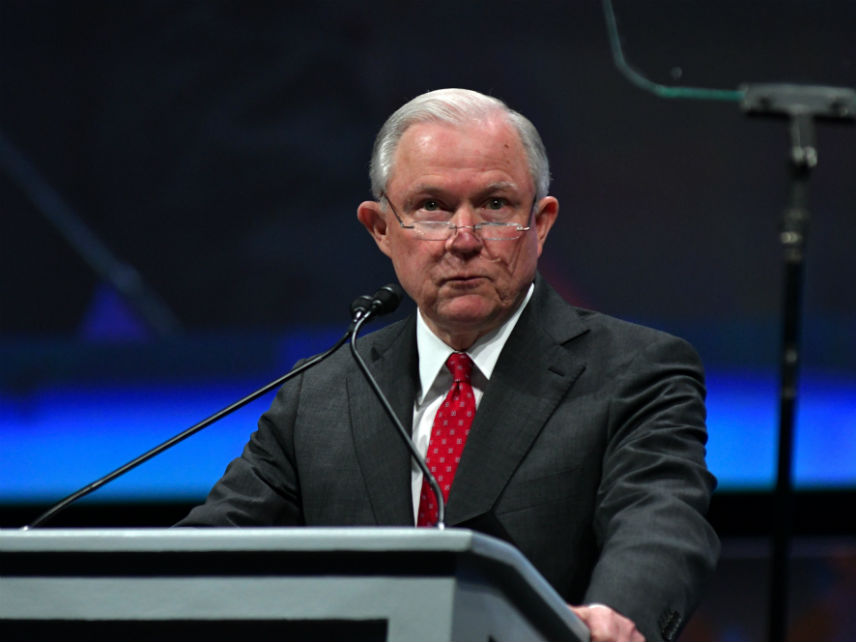Sessions Continues to Push 'Gateway Drug' Myth About Marijuana
"Much of the addiction starts with marijuana."

U.S. Attorney General Jeff Sessions continued his increasingly lonely crusade against marijuana today, warning that the U.S. has strayed too far from the "just say no" mantra of the 1980s, to our mortal peril.
In remarks this morning at the conservative Heritage Foundation, Sessions lamented the country's increasing nonchalance about pot. "I do think this whole country needs to not be so lackadaisical about drugs. Much of the addiction starts with marijuana," Sessions said. "It is not a harmless drug." (Jacob Sullum's comprehensive 2003 article on the "gateway drug" theory is here. In more recent developments, opioid overdoses in Colorado have fallen by six percent since the state legalized recreational marijuana, after 14 years of steady increases.)
Happily, Sessions' concerns are increasingly falling on deaf ears, even in his own party. As Reason reported Wednesday, a new Gallup poll found record high support for marijuana legalization—including, for the first time, a majority of Republicans. According to the survey, 64 percent of all American adults, including 51 percent of Republicans, think the drug should be legal.
Sessions has always been a hardline supporter of the war on drugs, but a federal crackdown against states that have legalized marijuana for recreational and medicinal use has yet to materialize. In August, the Justice Department's Task Force on Crime Reduction and Public Safety did not recommend any major changes to the 2013 memo outlining a largely hands-off approach to marijuana enforcement in states that have legalized it.
However, in separate comments today during an interview with conservative radio host Hugh Hewitt, Sessions said he still believes those states are in direct conflict with federal law, though he couldn't comment on ongoing Justice Department investigations or pushback against state marijuana programs.
"I do not believe there is any argument that because a state legalizes marijuana that the federal law against marijuana is no longer existence," he continued. "I do believe that the federal laws clearly are in effect in all 50 states and we will do our best to enforce the laws as we are required to do so."
In lieu of putting the kibosh on state marijuana regimes, Sessions has called for a return to "just say no" anti-drug messaging of yesteryear. But as I wrote earlier this year, his nostalgia for the DARE program does not quite square with the facts:
It's more than a bit generous to attribute declining drug use to factors like the Justice Department's devastating war on crack and commercials where the Ninja Turtles tell kids not to smoke reefer. Drug use among teens began declining around 1981, well before the creation of DARE and well before the Reagan administration's amped-up war on narcotics, according to annual surveys by the Monitoring Our Future study.
Teen drug use continued to decline through the '80s, but it started rising again in 1992, when DARE was already ubiquitous in school curricula around the country. That rise leveled off around the end of the decade. Reported teen drug use fell and rose slightly again during the 2000s. And then, despite the lamentations of drug warriors like Sessions over the purported perils of marijuana legalization, it started dropping again in 2014.
The National Institutes of Health's most recent annual survey of teenage drug use found marijuana use among teenage age groups either declined or remained steady in 2016, despite the increasing availability of legal marijuana.


Show Comments (32)